Breast Cancer Treatment
In Hyderabad
Get Clinically Successful Advanced Treatments for Breast Cancer From Experienced Cancer Oncologist at Onco Cancer Centres, Hyderabad
- Best-In-Class Services & Quality Treatments
- Same day Investigation + Treatment Initiation
- Dedicated, Advanced Oncology Facility
- Affordable Diagnostics
- Low-cost Advanced Treatment Options With Zero-cost EMI
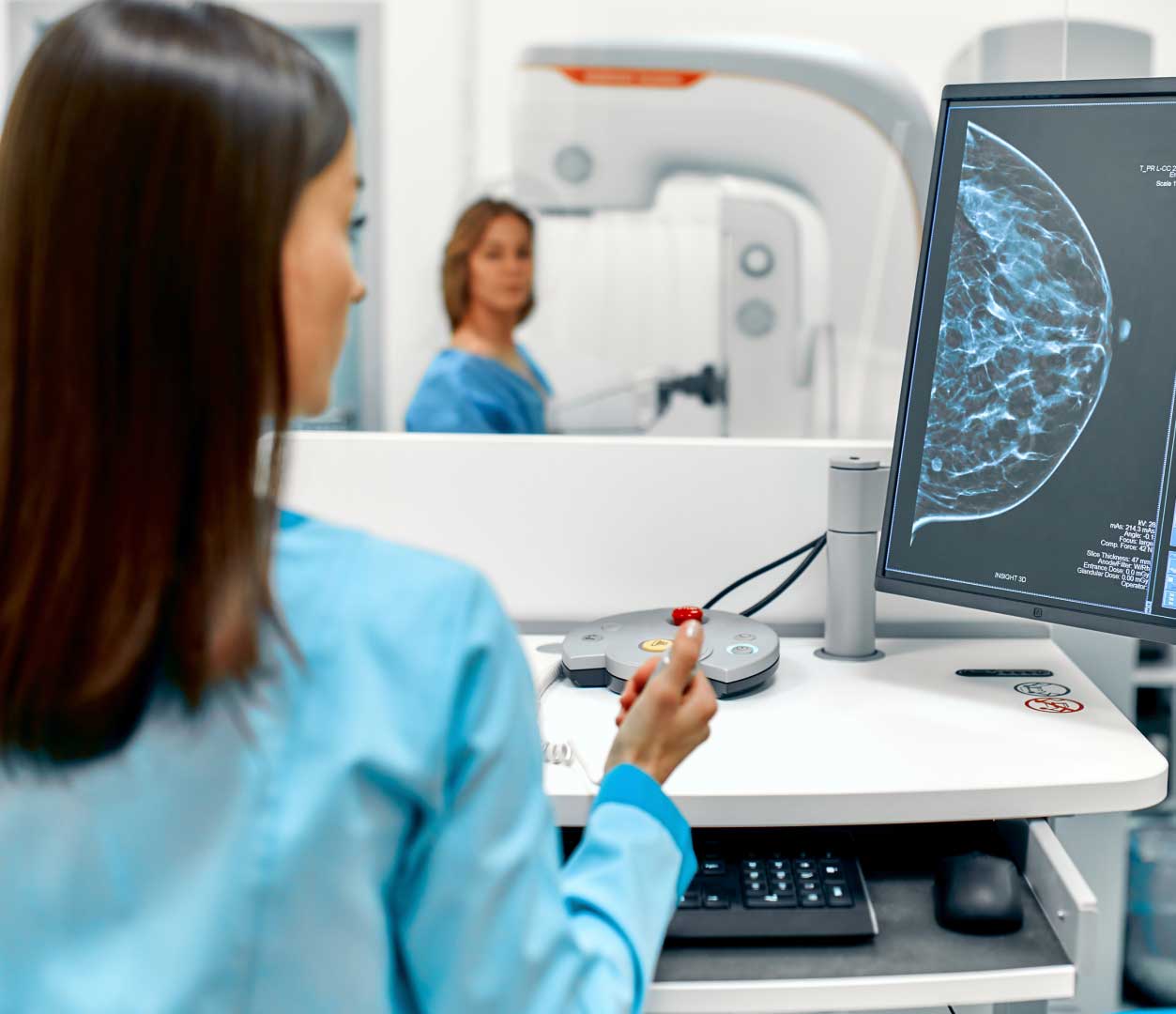
What is Breast Cancer?
Breast cancer occurs when cells grow uncontrollably in either breast. It then spreads and invades other body parts. Breast cancer is more likely to affect women over the age of 50 and rarely occurs in men. There are different types of breast cancers that are named based on the type of cell or tissue affected.
Our Team of Top Breast Cancer Specialists In Hyderabad
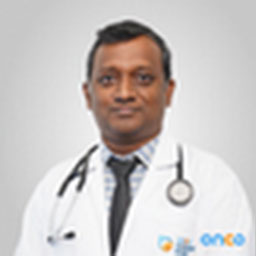
Dr. Rakesh Shankar Goud
MBBS, DNB-Radiation Oncology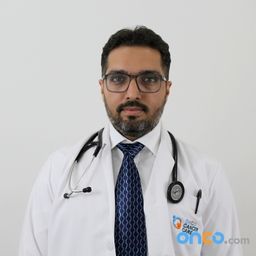
Dr. Abid Ali Mirza
Surgical Oncologist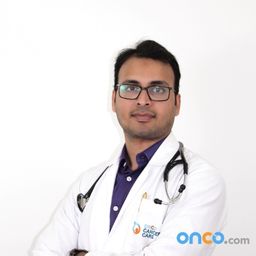
Dr. M A Suboor Shaheerose
Medical Oncologist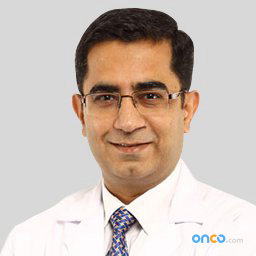
Dr. Amit Jotwani
CoFounder, CMO, Chief Oncologist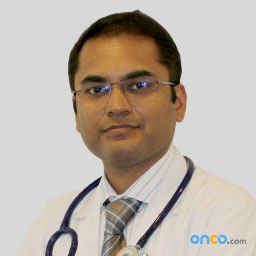
Dr. Shikhar Kumar
Consultant Medical Oncologist
Dr. Rakesh Shankar Goud
MBBS, DNB-Radiation Oncology
Dr. Abid Ali Mirza
Surgical Oncologist
Dr. M A Suboor Shaheerose
Medical Oncologist
Dr. Amit Jotwani
CoFounder, CMO, Chief Oncologist
Dr. Shikhar Kumar
Consultant Medical Oncologist
Dr. Rakesh Shankar Goud
MBBS, DNB-Radiation Oncology
Dr. Amit Jotwani
CoFounder,CMO,Chief Oncologist
MD (Radiotherapy), FHPRT, SBRT(Netherlands), AMPH

Dr. Shikhar Kumar
MD, DNB,DM – Medical oncology, ECMO
MD (Radiotherapy), FHPRT, SBRT(Netherlands), AMPH

Dr. Rakesh Shankar Goud
MBBS, DNB-Radiation Oncology
MD (Radiotherapy), FHPRT, SBRT(Netherlands), AMPH
Take Benefits of Our Onco Cancer Centres
- Multi-disciplinary care
- Hassle-free consultation
- Doctor consultation for more than 30 minutes
- Advanced technology like scalp cooling, leg massager at the center
- Tele-consultations available with oncologists across the country
- Second opinions offered free of cost
- Complementary diet plans
- Discharge process Less than 1 hour
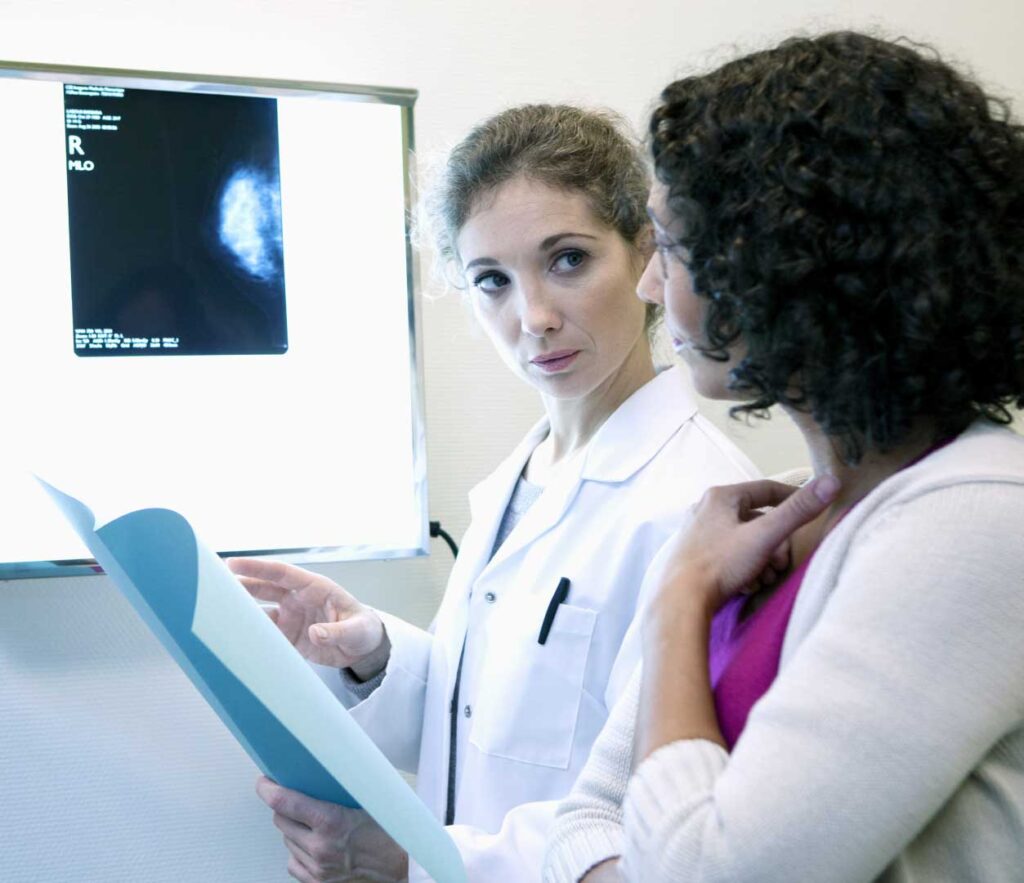
Signs and Symptoms of Breast Cancer
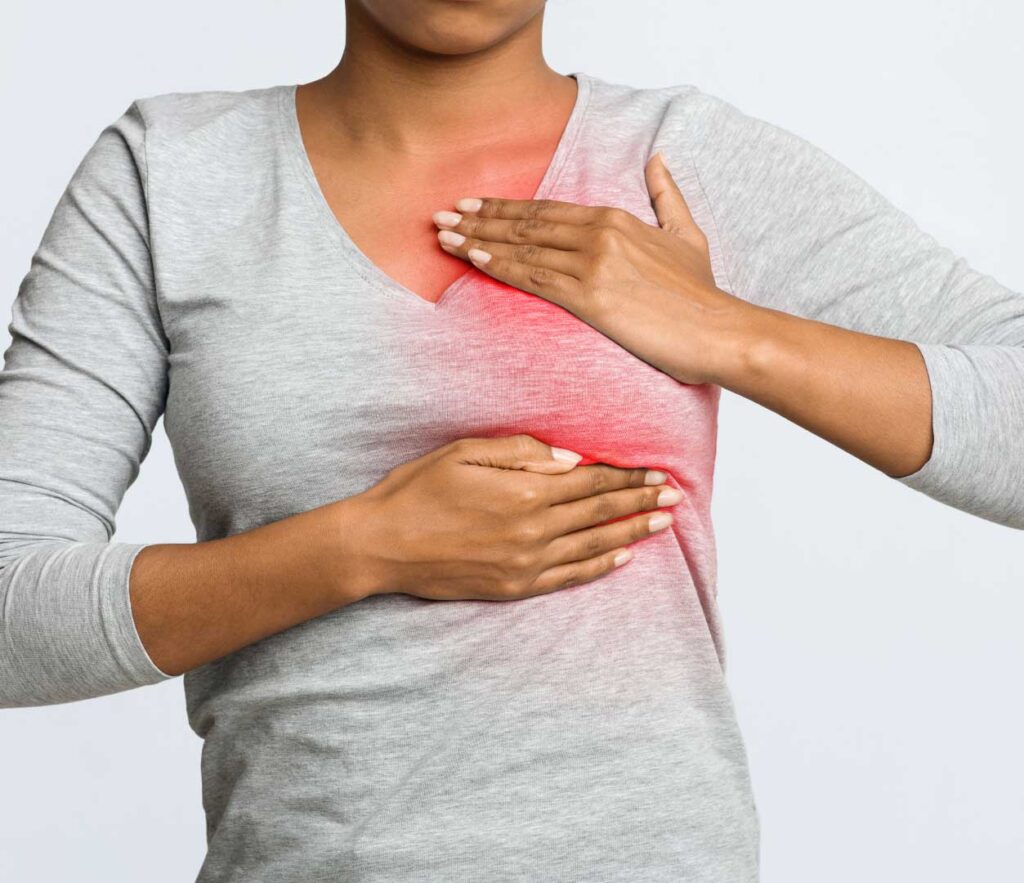
- Change in size, shape, and colour of one or both the breasts
- A lump in the breasts or underarm area
- Thickening of the skin in and around the breasts and in the armpits, mainly during menstruation
- Inward turning of the nipple
- Dimpled skin on breasts
- Itchy or sore Nipples
- Swelling of a part or whole of the breast
- Unusual discharge from the nipple
Consult an oncologist and get breasts examined
Diagnostic Tests for Breast Cancer in Hyderabad
Screening mammogram: It is a reliable screening test for breast cancer. It helps to find any abnormal growths in your breasts through an x-ray. Diagnostic tests include
Breast ultrasound: An ultrasound machine uses sound waves of the internal organs to create images of the tissues inside the breast. Breast MRI: An MRI scan gives detailed images of the breasts. This helps determine how far the cancer has spread.
Breast biopsy: A biopsy is the most accurate way to diagnose breast cancer type and grade of cancer cells.
Get Diagnostic Tests On Discount
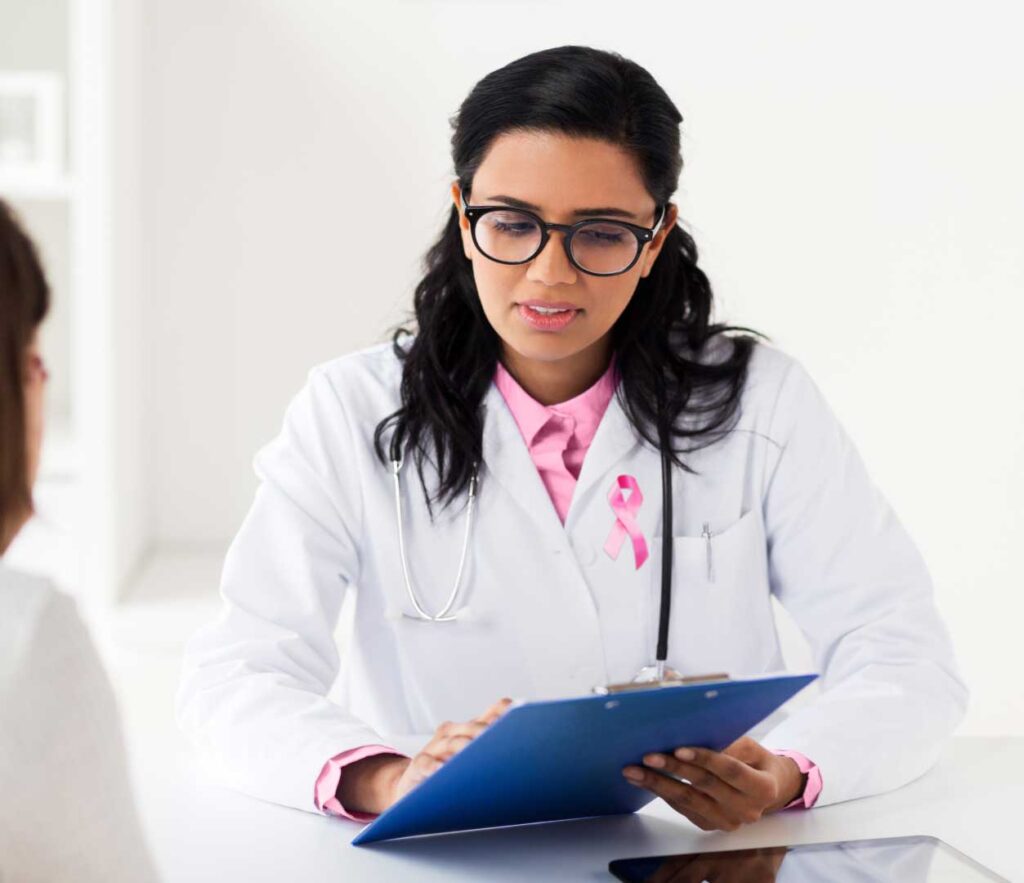
Advanced Procedures for Breast Cancer Treatment in Hyderabad
Surgery for Breast Cancer: A surgical oncologist is the one who specialises in performing surgery and will do surgery for breast cancer. Breast cancer surgery is performed in different ways:
Lumpectomy: This surgical procedure removes only the tumours and a little portion of surrounding non-cancerous tissue, leaving most of the breast behind.
Mastectomy: This surgical procedure removes the entire breast. Mastectomy is included with two different procedures such as skin-sparing mastectomy and nipple- sparing mastectomy.
If surgery is not possible. Doctor will recommend Chemotherapy, Radiation therapy, Targeted therapy, Immunotherapy, or frormonal therapy to shrink the tumours.
Talk To Our Expert Oncologist
Cost of Breast Cancer Treatment in Hyderabad
The cost of breast cancer treatment may vary depending on hospital facilities, medical expertise, pre-treatment costs (consultations, blood tests, and scans), type of treatment you are receiving, and post-treatment costs (follow-up consultation for periodic checks including tests, scans, rehabilitation, and medications).
To know the cost details for your breast cancer, you can call us at 8008575405 and we will give you an estimate.
Approximately, the cost of breast cancer treatment in Hyderabad ranges between INR 1,50,000 to INR 7,00,000.
Get Best Quote For Breast Cancer Treatment in Hyderabad
Clinical Experience & Patient Stories
We are always pleased to hear positive feedback about Onco Cancer Centres. Here are some of the testimonials we’ve received from our Patients
Anil Kawale
Chandra Kishore
Mahesh P
Vihar B. Ghutugade
nagaraju mogulla
Namit Singh
Santosh Kumar
Hari Santhosh kumar
Anil Kawale
Chandra Kishore
Frequently Asked Questions on Breast Cancer Treatment in Hyderabad
The cause of a particular type of breast cancer is unknown. But, there are certain risk factors that can increase the chances of getting breast cancer. Such factors include:
- Age: For some people as their age increases, their chances of getting breast cancer also increases.
- Genetic mutations: Having a personal or family history of breast or ovarian cancer with gene mutations, then both men and women in their families are at increased risk
- Previously treated with radiotherapy, mainly to the chest area
- Certain hormone therapies
- Being overweight
- Conceiving after 30 yrs or not breastfeeding can also fall under risk factors
- Lifestyle risk factors including drinking alcohol and not being physically active can also increase your risk. So, try to follow a healthy lifestyle and stay physically active to avoid the risk.
The next important step after diagnosis is the staging of cancer. Your doctor will assign a stage to your breast cancer based on the results of diagnostic tests. A particular stage defines the severity of cancer and how far it has spread. Generally, breast cancer can be described in 5 stages, from stage 0 to stage 4.
Stage 0: Cancer is present only in the milk-producing ducts and is less likely to affect nearby healthy tissues. The 5-year survival rate is 100% for every woman at this stage.
Stage I: In this stage, tumours are smaller and cancer is confined to the breast. It is the earliest stage of breast cancer and the 5-year survival rate is 100%.
Stage II: Here, tumours can be smaller or slightly larger and may spread to lymph nodes in the underarm region. Women with this stage can have a 50% chance of having a 5-year survival rate.
Stage III: Breast cancer is locally advanced at this stage and has spread to surrounding healthy tissues and lymph nodes. Women with this stage can also have a 50% chance of having a 5-year survival rate.
Stage IV: This is the last stage, also called the metastatic stage. Here, cancer has spread to distant organs such as the liver, lungs, bones and brain, and the 5 yr survival rate is low.
Early-stage breast cancers have higher chances of getting cured including stage 3, Only stage 4 is complicated to cure but it can be treated to prolong life to some extent.
Along with the staging, doctors also find out the grade of your breast cancer with the help of a biopsy. Grade refers to the characteristics of cancer cells and is explained as grade 1, grade 2 and grade 3. In grade 1, cancer cells look almost like normal cells and grow slowly, so there are fewer chances of getting metastasized, whereas grade 3 cancer cells are aggressive and spread rapidly.
Breast cancer first spreads to nearby lymph nodes in the underarm region, around the collarbone and breast, and can also affect surrounding healthy tissue. If undetected at this stage, it gradually metastasizes and spreads to the liver, lungs, bones, and brain.
Signs may vary depending on where the breast cancer has spread. Some of the signs it shows while spreading are as follows.
- Bone pain or fractures if spread to bones
- Headaches or dizziness if the brain is affected
- Chest pain, shortage of breathing, coughing and fatigue if spread to the lungs
- Breast pain, unusual discharge from the nipple, lumps or thickening of breasts or in the underarm if the chest wall is affected
- Nausea, swelling of feet or hands and jaundice if spread to the liver
- Pain, memory loss, headaches, blurred vision, double vision, difficulty with movements and seizures if the brain or spinal cord is affected
Women or men with a personal or family history of breast or ovarian cancer due to genetic mutations are at a very higher risk for breast cancer. In addition, growing age, a history of radiotherapy to the chest area, being overweight, being an alcoholic, physically inactive lifestyle, and certain hormonal therapies can increase the risk of breast cancer.
Yes, gynaecologists can perform clinical breast examinations to check for any signs of cancer. It is recommended to make an appointment with a gynaecologist once a year from the age of 13 or 15. During the consultation, your gynaecologist will look for any lumps, enlarged lymph nodes and skin changes in the breasts or underarm area. If your doctor finds any indicative signs of breast cancer, then diagnostic tests will be offered or else you will be referred to a relevant oncologist.
If you are at risk of developing breast cancer, it is important to go for screening to find it early. Mammograms are the standard screening tests that can effectively detect breast cancer. It takes an x-ray of the breasts and the procedure lasts for 3 – 5 min. There are several types of mammograms and your doctor can recommend the right one for you. Women aged between 40 to 44 years can go for screening once a year with a doctor’s approval. Women between the ages of 45 to 54 are advised to undergo mammography every year. But women over 55 can get a mammogram every two years. If any woman has higher risk factors like genetic mutations, personal or family history of breast cancer, then screening with a mammogram along with a breast MRI is recommended every year starting at age 30.
Early-stage breast cancers have higher chances of getting cured. Stages 1 and 2 can be effectively cured with surgery and subsequent radiation therapy. There are cases where even a stage 3 breast cancer patient was also cured and lives in remission. But metastatic breast cancer that is at stage 4 and has spread to other body parts cannot be cured but can be treated to prolong the life span.
Long-term side effects are seen in a few people depending on the kind of treatment they received. Breast cancer treatment commonly causes changes in the physical appearance of breasts, persistent pain, fluid accumulation in lymph, fatigue, weakness, respiratory system problems, and problems in remembering things, inability to pay attention, and problems in taking decisions.
After finishing the treatment, you are considered breast cancer free if you have been in remission for five years or more with no signs of cancer recurrence. For some people, there are chances of cancer recurrence. So, you should have regular follow-ups with your doctor for monitoring your health.
Related Blogs

6 Daily Habits That Increase Your Risk of Cancer
If someone in your family or friend’s circle has been diagnosed with cancer, you may wonder…
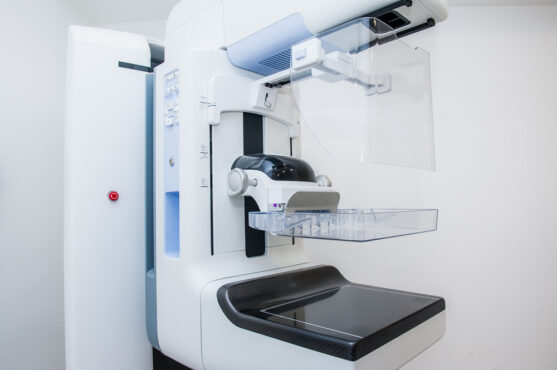
3D and Other Types of Mammography
The goal of breast cancer screening is to find cancer early, before it has a chance to grow, spread…
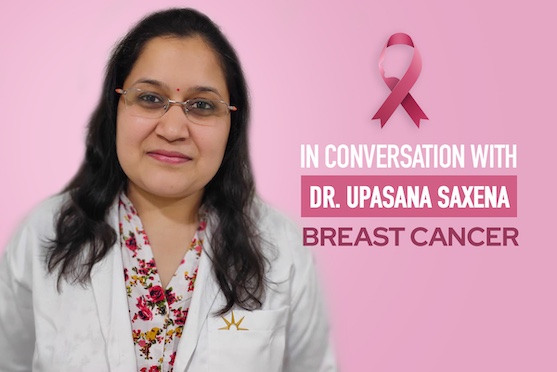
How to manage a breast cancer journey?
This Breast Cancer Awareness Month we speak to senior radiation oncologist Dr. Upasana Saxena…
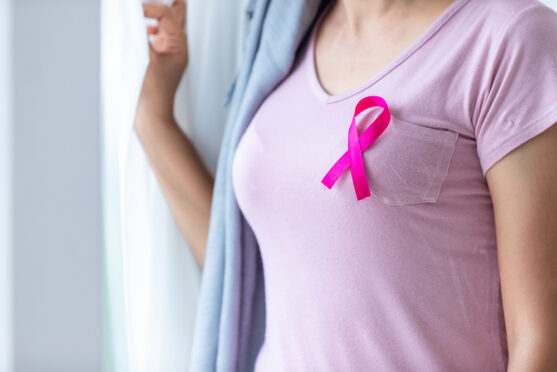
What You Need To Know About Breast Conservation Surgery
Surgery plays a very important role in the treatment of breast cancer. Earlier, surgery for breast cancer…
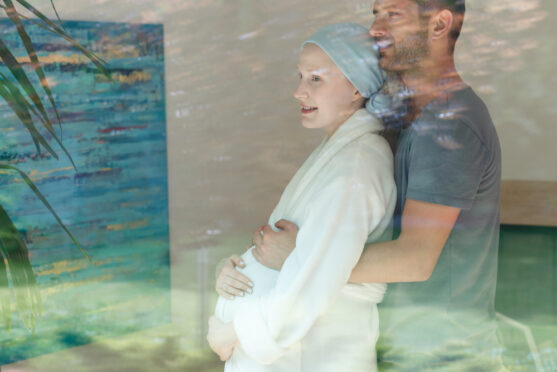
Breast Cancer During Pregnancy
Breast cancer is the most common cancer diagnosed during pregnancy. 1 in 3000 women develop breast cancer…

6 Daily Habits That Increase Your Risk of Cancer
If someone in your family or friend’s circle has been diagnosed with cancer, you may wonder…

3D and Other Types of Mammography
The goal of breast cancer screening is to find cancer early, before it has a chance to grow, spread…

How to manage a breast cancer journey?
This Breast Cancer Awareness Month we speak to senior radiation oncologist Dr. Upasana Saxena…

What You Need To Know About Breast Conservation Surgery
Surgery plays a very important role in the treatment of breast cancer. Earlier, surgery for breast cancer…

Breast Cancer During Pregnancy
Breast cancer is the most common cancer diagnosed during pregnancy. 1 in 3000 women develop breast cancer…

6 Daily Habits That Increase Your Risk of Cancer
If someone in your family or friend’s circle has been diagnosed with cancer, you may wonder…

3D and Other Types of Mammography
The goal of breast cancer screening is to find cancer early, before it has a chance to grow, spread…

How to manage a breast cancer journey?
This Breast Cancer Awareness Month we speak to senior radiation oncologist Dr. Upasana Saxena…

